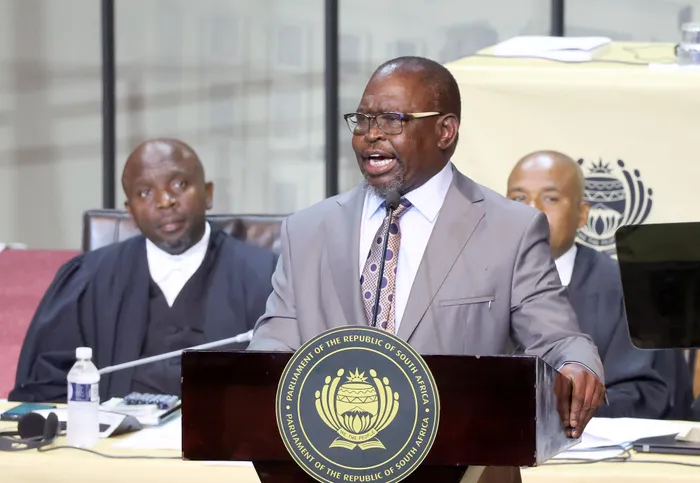Financial markets cheer as South Africa tables its National Budget after third attempt
BUDGET

Finister of Finance, Enoch Godongwana, delivers the 2025 Budget Speech during the National Assembly plenary at the Cape Town International Convention Centre.
Image: GCIS
The financial markets have warmly embraced the tabling of South Africa's National Budget for the third time on Wednesday, with the rand remaining stable below the psychological R18-mark to the US dollar.
Wichard Cilliers, director and head of market risk at TreasuryONE, said the rand held steady against the US dollar as the budget speech was delivered without hiccups.
“It has been well received and now needs to be passed by Parliament. The implementation of the budget remains key, and we will need to see if the government can actually deliver,” Cilliers said.
“The dollar fell for its third straight day of losses, reaching the lowest level in a month. Persistent concerns over the US budget deficit drove the decline, as did market speculation around the Trump administration's support for a weaker currency.”
Tabling the 2025 Budget Review before Parliament on Wednesday, Finance Minister Enoch Godongwana emphasised that the government's strategy prioritised fiscal discipline while simultaneously investing in growth.
Godongwana said the National Treasury was set to implement a significant reduction in government spending totalling R68 billion over the next three years.
This decision followed an extensive spending review of R300bn, aimed at addressing inefficiencies in public expenditure as the country grapples with fiscal constraints in the absence of new tax revenue.
Godongwana said the National Treasury's strategy of maintaining fiscal discipline while investing in growth demanded that it prioritised high-impact expenditures, those that deliver economic returns while eliminating inefficiencies, wastage and leakage that too often plague government’s spending.
"To tackle this, the National Treasury has undertaken expenditure reviews looking at more than R300bn in government spending since 2013, with the aim of identifying duplications, waste and inefficiencies," he said.
"We found potential savings of R37.5bn over time through improved oversight and operational changes through these reviews. Going forward, underperforming programmes will be closed as the 2026 Medium-Term Expenditure Framework (MTEF) budget process undergoes redesign."
Godongwana said the Treasury had managed to introduce spending cuts without compromising the fiscal strategy of sustainable public finances.
"We have achieved this difficult balance by reducing additional spending over the medium term by R68bn. These reductions are primarily aimed at provisional allocations not yet assigned to votes. Simply put, this means baseline allocations across all spheres of government remain largely unchanged," Godongwana said.
"Instead, the size of the proposed increases to allocations is reduced, in line with what we can afford. Our focus going forward is threefold: balancing the budget through spending efficiencies, strengthening revenue collection, and giving expression to the Medium-Term Development Plan.
"This undertaking is not insurmountable if we work together, stay focused, and persevere to chart a better course for our economy and our people."
Godongwana said the gross government debt was expected to increase from R5.69 trillion in 2024/25 to R6.09trln in 2025/26, and R6.82 trln in 2027/28.
However, he said the gross borrowing requirement was projected to decline by a total of R30.2bn between 2024/25 and 2027/28, mainly due to lower projected spending relative to the March 2025 Budget Review.
In 2025/26, government debt is projected to stabilize at 77.4% of GDP. While this is 1.2% higher than projected in the March 12 budget, it is mainly due to lower nominal GDP.
Dr Elna Moolman, Standard Bank Group head of South Africa Macroeconomic Research, said the confirmation of the government’s commitment to fiscal consolidation, with the debt-GDP ratio peaking this year and bond issuance kept unchanged, should provide some reassurance to financial markets.
“The abovementioned macroeconomic policy reviews and fiscal reforms, alongside ongoing traction with Operation Vulindlela’s growth-supportive reforms, also underpin likely fiscal and growth improvements in the medium term,” Moolman said.
“However, entrenched investor concerns about adverse fiscal and growth risks won’t be negated, and notwithstanding the imminent peak in the debt-GDP ratio and unchanged nominal debt trajectory, investors will emphasise yet another increase in the debt-GDP trajectory. This limits the potential positive financial market impact from any positive fiscal developments.”
Godongwana said work was under way to enhance the budget process – the foundation for sustainable public finances – and improve the efficiency and effectiveness of public spending.
He said this included the fiscal anchors reform and the early retirement initiative that were outlined in the 2024 MTBPS and March 2025 Budget Review.
According to the Budget Review 2025, the consolidated government expenditure increases at an annual average of 5.4%, from R2.4 trillion in 2024/25 to R2.81trln in 2027/28.
Visit: www.businessreport.co.za